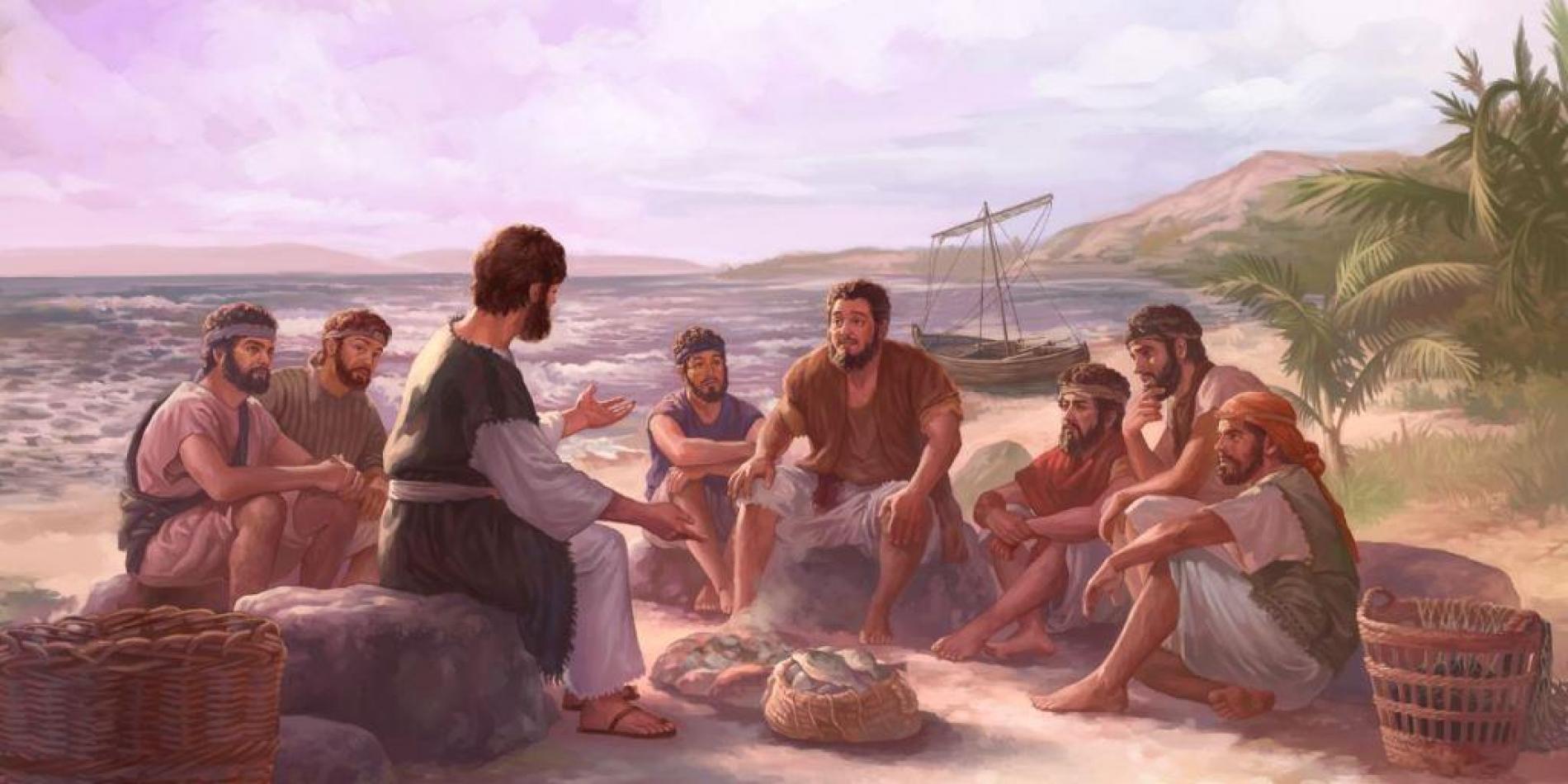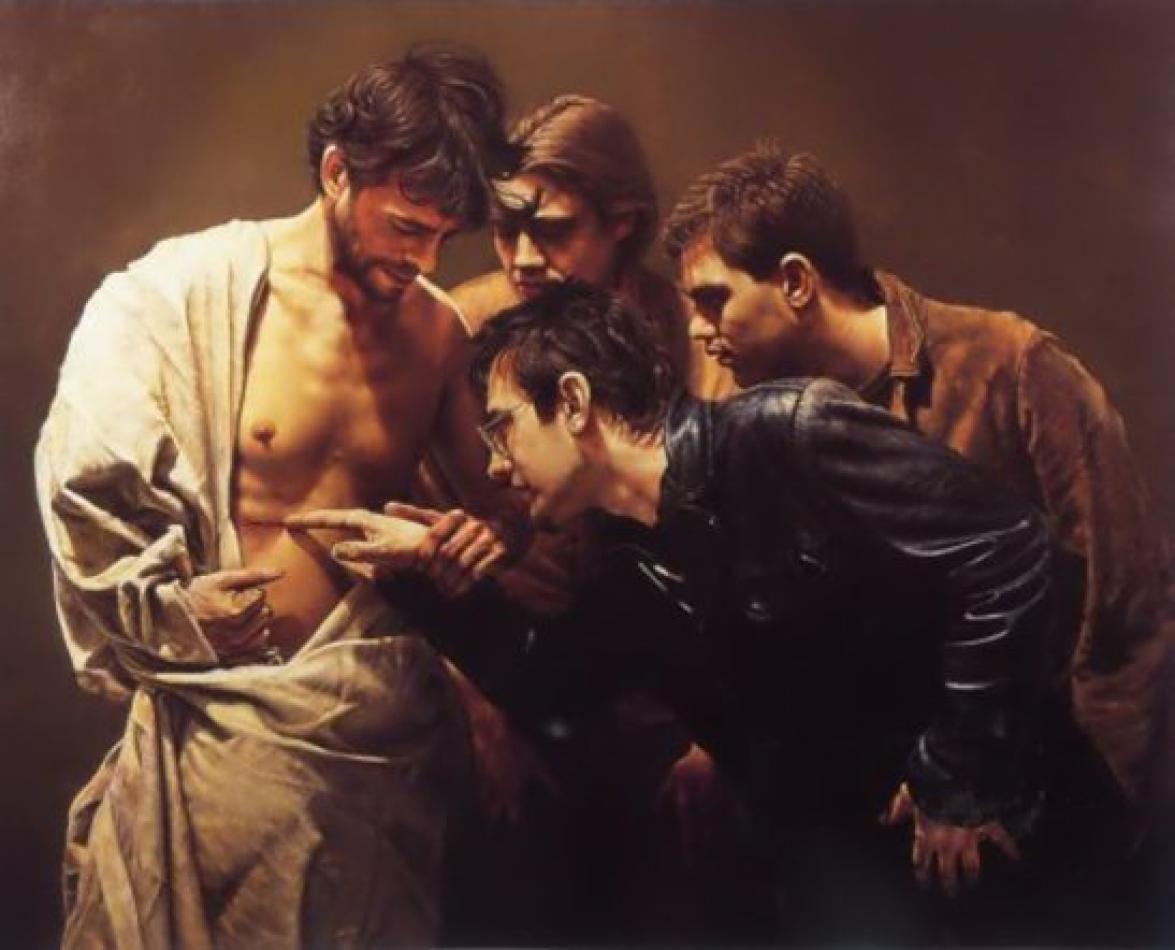Daniel Comboni
Comboni Missionaries
Institutional area
Other links
Newsletter
If we consider this passage just as the record of a fact made by an eyewitness, there are surely some difficulties. The fact that, after so many manifestations of the Risen One, the disciples still did not recognize his surprises. It is already the third time they meet him (v. 14), and yet there is a strong feeling that they have never seen him before.
Gospel reflection – John 21: 1-19
If we consider this passage just as the record of a fact made by an eyewitness, there are surely some difficulties. The fact that, after so many manifestations of the Risen One, the disciples still did not recognize his surprises. It is already the third time they meet him (v. 14), and yet there is a strong feeling that they have never seen him before. Then, it is not clear why they marvel at the miraculous catch; Luke says that they had already witnessed a similar incident in the day when Jesus invited them to follow him to become fishers of men (Lk 5:1-11). Then again, why did Peter and the other apostles in Galilee resume their normal life as fishermen? After Easter, why were they not immediately and completely dedicated to the proclamation of the Gospel?
These difficulties are valuable because they make us suspicious about the literary genre of the text: we are not in front of a page of the news report, but in a piece of theology and the language used is biblical, not journalistic. It is therefore difficult to determine what really happened. The evangelist certainly wants to say that the apostles have had the experience of the Risen One, but primarily wants to give catechesis to the Christians of his community.
Last Sunday he told us two manifestations of the Lord: one which occurred on Easter Sunday, in the absence of Thomas, the other, eight days later, Thomas was present. This insistence on the “weekly” rhythm—we said—was the way John wanted the Christians to become aware that every time they gathered, on the Lord’s Day, to celebrate the Eucharist, the Risen Lord was in their midst.
Unlike the Gospel of last week, that of today does not put the appearance of Jesus on Sunday, but on a weekday, while the disciples are intent on their work. They have therefore returned to their everyday life. What do the disciples of Christ do during the week, what is the mission entrusted to them and how do they bring it to fruition? To these questions, the evangelist responds by telling an episode full of symbolism that now we will try to decode.
Let is start with the occupants of the boat. There are seven of them. This number represents perfection, completeness. Peter and the other six represent all the disciples who make up the entire Christian community. The symbolism could go even further to seize, in the identity of those disciples, an image of the various types of Christians who, despite their limitations and their faults, have still the right to citizenship in the Church: those who have difficulty to believe (Thomas), those a bit ‘fanatic’ (the two sons of Zebedee, who wanted to call down fire of heaven against the opponents; Lk 9:54), those who denied the Master (Peter), those tied to the traditions of the past, but honest and open to the signs of the times (Nathaniel), and also the anonymous Christians who are not known by anyone (the two unnamed disciples).
The sea, we have often noted, was, among the Israelites, the symbol of all the forces hostile to humanity.
If being under water means being at the mercy of evil, to fish, then, means to pull out of this condition of “non-life,” to free from the evil forces that keep people in death situations. Think of all the slavery that keep us from living with joy, from smiling: the greed of money, grudges, unruly passions, drugs, pornography, anxiety, haste, remorse, fear … .
Now it is clear what Jesus meant when he told his disciples: “Follow me, and I will make you fish for people” (Mark 1:17). In fact, here they are at work. Peter is back to do his job, his is material fishing, but—in the theological language of the evangelist—it indicates the apostolic mission of the Church committed to the liberation of people. In the Gospel of Matthew, “the kingdom of heaven is likened to a net cast into the sea, which collects fish of every kind, and when full it is dragged to shore” (Mt 13:47-48).
The night with darkness that accompanies it has also a negative meaning. “Those who walk at night stumble” (Jn 11:10), “the one who follows me will not walk in darkness” (Jn 8:12)—Jesus said. During the night no one can act or orient oneself (Jn 9:4). Without light, the “fishing” of the disciples cannot get any results.
Not only light is lacking, but also Jesus, indeed—according to the symbolism of the evangelist John—there is no light because there is no Jesus “the light of the world” (Jn 8:12). Peter and others are committed to the utmost in the mission that has been entrusted to them but do not conclude anything. They could guess the reason for their failure if they remembered the Master’s words: “Apart from me you can do nothing” (Jn 15:5).
They are alone, maybe they also feel abandoned in the midst of dangers and difficulties. They think they have to carry out their mission of “fishers of men” relying solely on their ability and their strength. They do not see Jesus; they do not perceive his presence because they look tarnished by the lack of faith. They cannot even recall his reassuring words: “I will not leave you, I am coming to you … . The world will see me no more but you will see me” (Jn 14:18-19).
The Lord is not in the boat—it is true—he is on the shore; he has already reached the mainland, that is, the final condition of the resurrected. Towards this land, the disciples tend to and will reach.
At last the dawn breaks (v.4) and with the new day even the light comes, the real light “that enlightens every person” (Jn 1:9), that which “comes from on high as a rising sun” (Lk 1:78). It is Jesus. He can be seen and recognized only with the eyes of faith because he is the Risen Lord. His voice is sharp and perceptible; his word comes from the shore and guides the activities of the disciples. As soon as these trust in his words, the miracle happens: against all human logic, against all reasonable expectation they get an amazing result.
John wants the Christians of his community to come to understand that Jesus, while being on the “shore,” that is, in the glory of the Father, is always beside them every day and continues to resonate his voice, calling, talking, and indicating what they should do.
The result of the mission of the Church is shown by the extraordinary amount of fish caught: 153. This number has a symbolic meaning. It follows from 50 x 3 + 3. To the Israelites the number fifty indicated all the people; the number 3 represents perfection and fullness. Not even a fish escapes!
The sense of this curious detail is as follows: the Christian community will accomplish with great success her mission of salvation. All the people, all humanity will be freed from the bonds of death that hold her captive, prisoner and bring her to ruin, as the rushing waters of the sea drag to the bottom even the most skilled swimmers. The disciples will succeed in this huge undertaking—today’s Gospel ensures—on condition that they always allow themselves to be guided by the voice of the Risen One.
Peter pulls the net with fish to shore. Jesus had said: “When I am lifted up from the earth, I will draw all to myself” (Jn 12:32). And now, he realizes, through his disciples, the promise. No one will escape the work of salvation carried out by his community. The net does not break, despite the large amount of fish. This seemingly trivial detail contains a significant message: Peter manages to hold firmly and fully the unity of believers despite their numbers and the consequent diversity of culture, of ideas, of language.
The banquet which closes the story of the miraculous catch of fish is the symbol of the conclusion of salvation history. Jesus expects his disciples on land, in heaven. He has fish (v. 9): it is the product of the work he has accomplished in this world. We remember for example the good thief that he brought with him to heaven (Lk 23:43).
Like the seven disciples at the Sea of Galilee, so also the entire Christian community is asked to present the fish, the fruit of the apostolic work. Bread instead is always offered for free by Jesus; it is not carried by people. It is the Eucharist! It is the bread that the Risen One breaks and wants all brothers and sisters to share until the day in which the sacramental sign will be made full by final and definitive union with him and with the Father.
The last part of the passage (vv.15-19) describes the mission of Peter. Throughout the story, this apostle has occupied a prominent position. It was he who took the initiative to go fishing. Then, despite having recognized the Lord after the “disciple whom Jesus loved,” he was still the one to take hold of the net full of large fish and, without breaking it, to drag it ashore.
The symbolic significance of these details is undeniable: the primacy within the Christian community—so to speak—of the “sensitivity” is up to the unnamed disciple, but that of presiding the apostolic work and the unity of the Church is undoubtedly Peter’s. Although Peter systematically arrives “late” and often earns the reproaches of Jesus, he remains the reference point of church life. He is asked to shepherd the Lord’s flock.
The image of the shepherd arouses not only positive resonances; being compared to the lambs, perhaps unable to think and to decide responsibly, he is not liked by everyone. But this is not the meaning of Jesus’ words. He has not conferred upon Peter the power to command, to give orders like a shepherd with sheep and, less still, to be a privileged caste and detached from the community of brothers and sisters. Peter—we remember him—was not immune to this temptation. He got to the point of rejecting the gesture of the Master who wanted to wash his feet because one day he hoped to be able to lord over the flock.
Asking him to look after the sheep, Jesus demands from him a complete conversion, a radical change in his way of thinking and acting. He wants him to manifest a capacity to love unconditionally, superior to that of all others. To look after means to feed the brothers and sisters with the food of the Word of life.
It will not be easy for Peter to understand and accept this proposal. For a long time yet he will keep on clinging to his beliefs, his dreams. Only with the passing of years, after much hesitation, he will arrive to full conversion. In today’s Gospel, the end of his journey in following the Master is pre-announced. During the passion, he did not have the courage to be with Jesus. But one day—he was told—he will be placed in a position to give his life; he will experience coercion, imprisonment [“another will put a belt around you, and lead you where you do not wish to go” (v. 18)] and finally he will die on a cross [“you will stretch out your hands” (v. 18)].
Fernando Armellini
Italian missionary and biblical scholar
https://sundaycommentaries.wordpress.com




